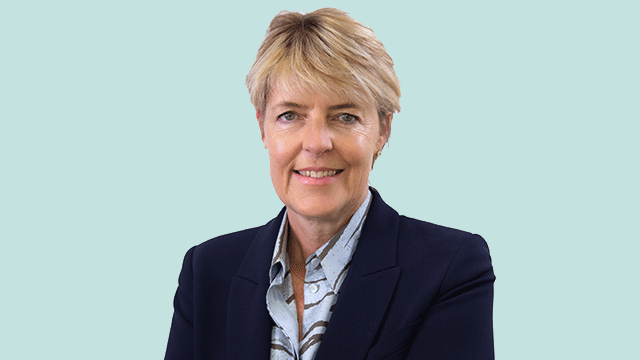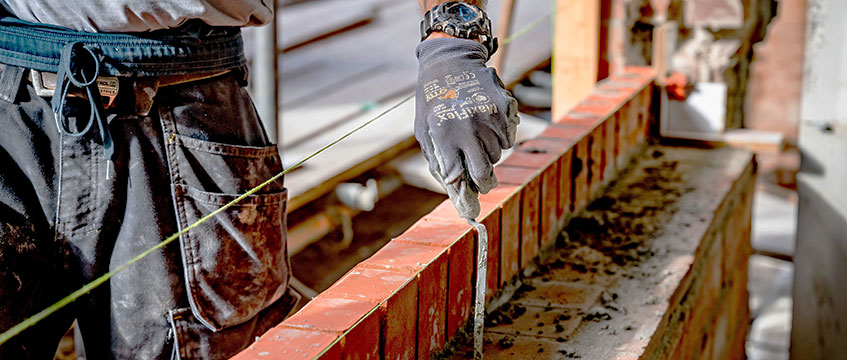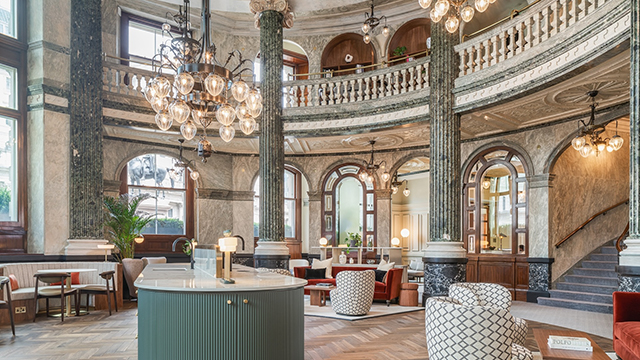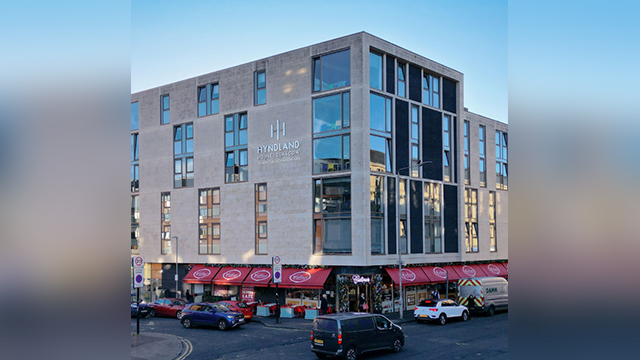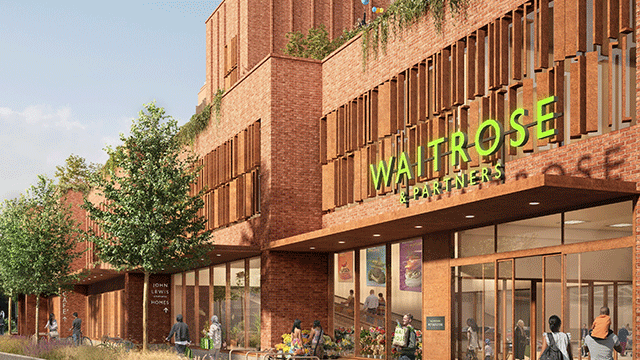Chill economic winds are blowing customers into Travelodge’s cheaper hotel rooms – supporting its ambitious expansion plans, says MD for development Paul Harvey. By Annabel Dixon. Portrait by Pål Hansen
As the credit crunch takes its toll on the Great British Public, Travelodge, like a number of budget retailers and operators, is looking to take advantage of the “Aldi effect”, where cash-strapped customers trade down.
While many occupiers are reining back their expansion plans, the budget hotel chain is pushing ahead with aggressive plans to add 1m sq ft of space to its portfolio this year, the equivalent of 4,000 rooms.
Currently, there are 240 Travelodges dotted across the UK, but Harvey hopes to quadruple this to 1,000 hotels by 2020.
Managing director of international development Paul Harvey says now is the perfect time for Travelodge to grow, as it can take advantage of the economic downturn.
“The hotel sector is polarising and the middle ground is getting squeezed. A lot of snobbery has gone out of the window and people now like to say they’ve got a good deal. It shows they’re smart,” says Harvey, 47, sitting in one of the chain’s hotel rooms in High Holborn.
“I obviously don’t welcome tough times, but in the short term they’re giving Travelodge some good opportunities. People will be trading down in terms of price and new sites will become available for us to develop.”
Harvey says that Travelodge can provide one piece of rare good news for the UK’s struggling housebuilders. Last month, Harvey sent out letters to the five major housebuilders and developers urging them to sell their unviable sites to the group for use as hotels. It has already met Berkeley, Persimmon and Redrow, and will be talking to other housebuilders in the coming weeks.
“Sites that would have gone for residential use a year ago are suddenly no longer attractive and those are exactly the sort of schemes that we want to acquire.”
Alongside approaches to down-on-their-luck housebuilders, Travelodge is also holding talks with value retailers Aldi and Lidl and pub chain JD Wetherspoon about opening hotels above their premises.
So far, Harvey has negotiated to build two hotels above Aldi stores – a 31,710 sq ft hotel in Newquay and an 18,000 sq ft hotel in Middlesbrough – and it says one other is in the pipeline. In fact, Harvey appears to be of the opinion that any building can become a budget hotel.
“We don’t rule out any particular space as long as the interior room standard and style is consistent. Our portfolio of properties includes converted offices, factories, town halls, a farmhouse and old telephone exchanges.
“Offices convert very well into Travelodge properties, especially 1960s and 1970s buildings,” he says. “Businesses often find this old office space is hard to develop, so Travelodge takes them on when the lease expires. We then simply redevelop the interiors and freshen up the exteriors.”
Travelodge has been intending to increase its portfolio of hotels for more than three years, but since sovereign wealth fund Dubai International Capital bought the company from private equity group Permira for £675m in 2006, the company has accelerated the expansion. Next week, the company will announce that it has signed leases on five sites, worth a total of £20.6m, in Blackpool, Lancaster, Birmingham Perry Bar, Hounslow and the space above the Aldi store in Newquay.
And the DIC fund, which has also been in the news for trying to buy Liverpool Football Club, has big plans for the budget chain.
“DIC’s purpose is all about growth. It liked Travelodge before the sale and it likes the chain even more now,” says Harvey, who joined Travelodge from Hilton International, where he worked for nine years in a number of senior positions including UK finance director vice-president, Japan & Micronesia and managing director, Livingwell. “The chain is highly cash generative and appeals to any investor.”
Last year, Travelodge posted £55.8m in profits on a turnover of £243.8m.
The chain wants to grow rapidly in central London and seaside towns, but is also looking at other city and town centres, particularly in the Home Counties. In London, Harvey wants to have a Travelodge within 100m of every Tube station on the London Underground network. At the moment, the company has 17 hotels in the capital but it intends to raise that to 220 by 2020.
For coastal towns, £150m has been allotted, with the aim of opening hotels in 50 new locations. “I don’t want to knock other hoteliers, but we found so many awful two- and three-star hotels in seaside locations that we saw a huge opportunity,” says Harvey.
Good year-round demand
“Seaside towns have good local economies and high leisure demand. Yes, there is a seasonal aspect to them, but they do also offer good year-round demand.”
He adds: “There’s never been a better time to take advantage of the British seaside. Travel costs have increased, the pound has weakened and people are becoming more aware of their carbon footprints.”
And perhaps the prospect of cash-strapped consumers trading down from long-haul holidays for cheap and cheerful trips to the Med is the driving force behind Travelodge’s launch of a toehold in Spain.
In 2004, the group leased two hotels in Madrid as a pilot project, and in 2006 it leased another in Barcelona. It now reckons it can add 100 properties to the three existing hotels it has in the country over the next decade. A small development team is quietly mobilising in Madrid to start building up a €1bn portfolio in the country.
“We like Spain, the country’s characteristics, its increasing prosperity, its appreciation of budget brands and internet penetration. We think Travelodge will be a success there too,” says Harvey.
Turning to the group’s ownership strategy in the UK, Harvey reckons Travelodge will have the upper hand over its competitors because it still takes leases on properties. These days, most hoteliers will take only management contracts – whereby operators pay a percentage of their turnover or operating profit rather than a set rent to their landlords. “We’ve never done management contracts and have no intention of doing so. If we did, we wouldn’t be growing at this rate.”
As part of its lease-only policy, Harvey says Travelodge is prepared to buy sites, build them and sell them onto developers through sale-and-leasebacks, even now that many developers are struggling to get loans. “We have a pool of funders in place, who can acquire land, fund the development and lease the property back to us. The funders are absolutely still in the game and are happy to keep the flow into Travelodge hotels. There is no question about that.”
And, in order to grow at such a rapid rate, Travelodge is experimenting with building prefabricated hotel rooms that are built in factories and shipped to their location, meaning that it can cut build costs by around 10% to approximately £36,000 a room.
“The rooms are built in China and shipped over in containers,” says Harvey. “Then each room is manoeuvred in just eight minutes from the lorry straight into place in the hotel. They’re like Lego bricks. This process is not standard though, as we do a lot of conversion. But it works well for new-builds and we’re encouraging developers to look at it.”
A 120-bedroom, container-built hotel is already in operation in Uxbridge, while a second, 307-bedroom property in Heathrow is on site. The expansion is rolling on.
“I am utterly confident in the future of the budget hotel sector,” says Harvey. “The low-cost model works well in a good economy and is resilient in difficult times. Budget is where the growth is. It’s a great place to be.”
PET Projects: smart jammies and muttresses
Aside from its expansion plans, Travelodge has also been looking at innovations in the growing budget hotel sector.
Dismissed by many as gimmicks, these include a mobile glass hotel room measuring only 6m by 2.4m, designed to appeal to campers hi-tech pyjamas made from Dermasilk, which is designed to allow the skin to breathe and regulate its moisture balance and even a scale replica of its luxury king-size bed to accommodate pets after it conducted a survey among 1,000 people, which found that almost two-thirds of respondents were unhappy leaving their pets at home while travelling.
Budget chain carries big price-tag
Travelodge was founded as a brand in 1985 by four-star hotel chain Trusthouse Forte as a cheaper alternative to its main outlets and to cash in on motorway travellers needing a bed for the night.
The group opened its first hotel that year in Barton under Needwood, north of Lichfield in Staffordshire on the A38 before developing another six roadside hotels in its first year.
By 2003, the group had grown to more than 200 hotels and had become the most recognised hotel brand in the UK. In February 2003, it was bought in a £712m package along with its sister operation, the service station restaurant chain Little Chef. The buyer was Europe’s largest private equity firm, Permira, which immediately announced plans to expand the portfolio to 2,500 rooms in 2005.
In 2004, Travelodge bought the 163-bed Drury Lane Moathouse Hotel, WC2, from Queens Moat House Hotels for £11m and also that year it signed a 25-year lease on a 113-bed hotel in Windsor and carried out sales-and leasebacks on two Thistle Hotels in north London for £55.5m. In 2006, the business was sold to Dubai International Capital for £675m.
Today, Travelodge employs 5,000 staff. It is investing £140m in London and aims to be the biggest hotel brand in the capital by 2012, when it wants to have 7,000 rooms. It is looking for 1m sq ft this year, equivalent to 4,000 hotel rooms, and has already exchanged on 900,000 sq ft.




